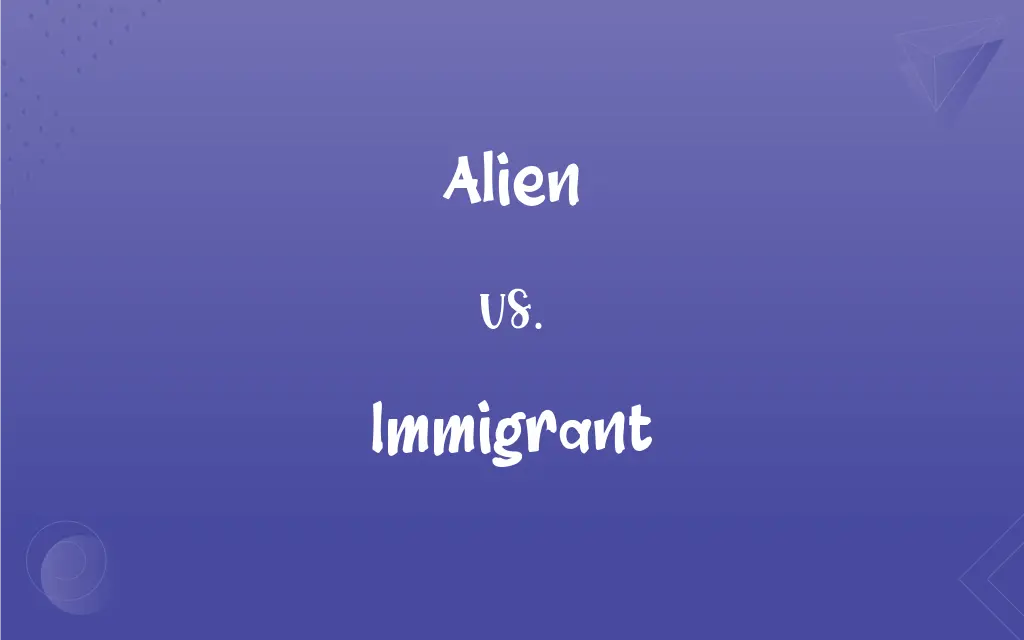Alien vs. Immigrant: What's the Difference?
Edited by Aimie Carlson || By Janet White || Published on July 23, 2024
An alien is a foreign national in a country, not a citizen; an immigrant is someone who has moved to another country to live permanently.

Key Differences
The term "alien" historically refers to any individual who is not a citizen or national of a given country. It emphasizes the foreignness or outsider status of the person from the perspective of the country's legal and social systems. Conversely, "immigrant" specifically denotes a person who has moved to a country with the intention to settle there permanently. This term focuses on the process of migration and the individual's decision to leave one country to make a new life in another.
"Alien" is a broad term that can apply to anyone from a foreign country, including tourists, students, and temporary workers, while "immigrant" implies a more permanent change of residence. The distinction lies in the duration and purpose of the stay. Immigrants have made a deliberate choice to relocate and possibly seek citizenship, whereas aliens may be in the country for a variety of reasons, both temporary and permanent.
The use of "alien" in legal and governmental contexts can sometimes have a negative connotation, suggesting detachment and non-belonging. Efforts to use more inclusive language have led to a preference for terms like "foreign national" over "alien" in many contexts. "Immigrant," on the other hand, is generally seen in a neutral or positive light, acknowledging the individual’s efforts to build a new life in a foreign land.
Both terms are essential in discussions about nationality, citizenship, and migration. Understanding the nuances between "alien" and "immigrant" is crucial for clear communication, especially in legal, social, and policy-related contexts. These distinctions help define the rights, responsibilities, and social perceptions of individuals moving across borders or living in countries where they were not born.
Comparison Chart
Definition
A non-citizen or national of a country
Someone who moves to another country to live permanently
ADVERTISEMENT
Legal Status
Can be temporary or permanent, does not imply intention to stay
Implies intent to stay and possibly seek citizenship
Connotation
Emphasizes foreignness, can be seen as excluding
Focuses on the act of settling and integrating
Examples
Tourists, business visitors, temporary workers
Permanent residents, naturalized citizens
Purpose of Stay
Broad, can be for various reasons
Specifically for permanent resettlement
Alien and Immigrant Definitions
Alien
A creature from outer space.
The movie depicted an alien from a distant galaxy.
ADVERTISEMENT
Immigrant
A person who moves to another country to live permanently.
The immigrant shared his journey of moving to a new country.
Alien
Someone from another country or place.
He felt like an alien in the new city.
Immigrant
Someone who has resettled in a new country.
Immigrants often face challenges in adapting to a new culture.
Alien
Not belonging to a particular place.
The customs of the land were alien to her.
Immigrant
A newcomer to a country, intending to reside permanently.
The community welcomed the immigrants with open arms.
Alien
Different in nature or character.
The concept was alien to their traditional way of thinking.
Immigrant
A person who leaves their home country to start a new life elsewhere.
Many immigrants bring valuable skills and knowledge to their new countries.
Alien
A foreign national in a country.
The alien was required to register with the local authorities.
Immigrant
One who has migrated to a country for permanent residence.
The policy changes affected many immigrants' ability to work.
Alien
Owing political allegiance to another country or government; foreign
Alien residents.
Immigrant
A person who leaves one country to settle permanently in another.
Alien
Belonging to, characteristic of, or constituting another and very different place, society, or person; strange.
Immigrant
An organism that establishes itself in an area where it previously did not exist.
Immigrant
Of or relating to immigrants or the act of immigrating.
Immigrant
A non-native person who comes to a country from another country to permanently settle there.
Immigrant
A plant or animal that establishes itself in an area where it previously did not exist.
Immigrant
Of or relating to immigrants or the act of immigrating.
Immigrant
One who immigrates; one who comes to a country for the purpose of permanent residence; - correlative of emigrant.
Immigrant
A person who comes to a country where they were not born in order to settle there
FAQs
What is an immigrant?
Someone who moves to another country to live there permanently.
Do immigrants have the right to vote?
In most countries, only after becoming citizens.
Can an alien become an immigrant?
Yes, if they decide to settle permanently in the country.
Are all aliens intending to stay permanently?
No, aliens can be in the country for temporary reasons.
Are refugees considered immigrants?
Yes, once they settle in a new country with the intent to stay.
What defines an alien?
A foreign national in a country, not a citizen.
What legal rights do aliens have?
Rights vary by country but often include basic human rights.
What process do immigrants go through?
Legal immigration procedures, possibly including obtaining a visa or citizenship.
Can an alien work in the host country?
Yes, if they have the proper work visa or permit.
What challenges do immigrants face?
Cultural adaptation, securing employment, and legal residency.
Why might someone be considered an alien?
If they are from a foreign country and not a national of the host country.
What benefits can immigrants receive?
Varies by country, but may include access to healthcare, education, and social services.
Can aliens own property?
Depends on the country’s laws; some allow it, while others have restrictions.
What is the path to citizenship for immigrants?
It typically involves residency requirements, language proficiency, and knowledge of the country’s history and government.
How do countries track aliens?
Through visa and immigration controls, and registration with authorities.
What is a non-immigrant visa?
A visa for aliens entering a country temporarily, for tourism, business, or study.
What distinguishes an illegal immigrant from an alien?
An illegal immigrant is in the country without legal permission, which is a subset of aliens.
What is the difference between an expatriate and an immigrant?
Expatriates temporarily live abroad, often retaining their original citizenship; immigrants plan to stay permanently.
How do immigrants contribute to a country?
Through cultural diversity, economic contributions, and filling labor shortages.
Are children born to immigrants automatically citizens?
In many countries, yes, through birthright citizenship; however, laws vary.
About Author
Written by
Janet WhiteJanet White has been an esteemed writer and blogger for Difference Wiki. Holding a Master's degree in Science and Medical Journalism from the prestigious Boston University, she has consistently demonstrated her expertise and passion for her field. When she's not immersed in her work, Janet relishes her time exercising, delving into a good book, and cherishing moments with friends and family.
Edited by
Aimie CarlsonAimie Carlson, holding a master's degree in English literature, is a fervent English language enthusiast. She lends her writing talents to Difference Wiki, a prominent website that specializes in comparisons, offering readers insightful analyses that both captivate and inform.






































































